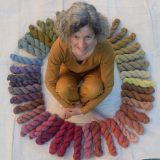Works
Lucía Ciller
August 26, 2022
Pilar Ureña Escariz
August 26, 2022I am a textile artisan on a loom and a natural dyer. After training for 9 years in traditional weaving on a loom and a natural dyer, I decided to leave my job as a civil servant in the administration and start a professional craft activity as a weaver and natural dyer.
My workshop is located in a small town with very few inhabitants in the north of Spain, in Asturias, in full contact with nature, which is my source of inspiration.
My business is in the early stages of creating a craft business and developing my brand.
I began to train in textile crafts due to my cultural heritage, in my family, my mother in her childhood had always had sheep and processed wool by hand, which led me to train more and more in the knowledge of textile crafts linked to my culture and tradition, even leading me to have my own small flock of endangered native breed sheep. The choice of this job is due to cultural, vocational and affective reasons.
Using traditional techniques, I sustainably make fabrics with contemporary designs on a hand loom using high-quality natural fibres from my own native herd and other local wool, as well as other natural fibres from organic production. I dye these threads preferably with plants from my environment and with others widely used throughout history.
My business objectives are:
My goals are economic, informative, environmental, and cultural.
From an economic point of view, I intend to make my business profitable and viable enough to be able to make a living from it.
I try to promote and disseminate more responsible forms of consumption, giving priority to Asturian wool and local proximity wool, which directly affects the territory in economic, cultural, environmental and social terms since wool is currently considered waste.
Divulge the endless possibilities of natural dry cleaning. All this is within the concept of healthy textiles.
In Asturias, the weaver trade was passed down from generation to generation. I intend to give continuity to this historical heritage, preserve a trade traditionally linked to women, maintain that knowledge and know that, despite the passing of the centuries, it continues to retain its reason of being, reworking tradition with contemporary designs, techniques, and functionalities. A trade that is worth protecting, and that constitutes a historical heritage of all.
The use of Asturian wool, which currently constitutes waste, bets on its value and disseminates it.
My learnings from the Crafting Business Programme:
The first thing is to know the current situation of crafts in our country, if I am starting a professional craft activity, knowing the sector is very important to be able to successfully tackle the project.
The importance of differential value, what differentiates me from other artisans in the sector, and how to enhance that value.
The importance of sustainability in each of the parts of our process and the social responsibility that we have as artisans with respect to it.
I have reworked and changed part of the value proposition that I had before starting the course, giving special relevance to that differential part of my business that resides in my own culture.
My 5 top tips that I have learnt on this journey:
- Knowledge is essential for your business to succeed, it is not enough to have specific technical training as a craftswoman, it is necessary to know all the aspects related to the creation of a company.
- Prepare a detailed plan for your project and keep an exhaustive and updated control of its compliance that allows us to quickly make the pertinent modifications at a given time.
- Strongly develop your differential value, you cannot reach the market by producing and doing the same as the competition, and that said value resides in me.
- Collaborating with other professionals is extremely enriching and constructive.
- Analysing in which parts of our creative process we are not sufficiently sustainable and looking for formulas to improve and reverse this situation, our social responsibility in this aspect is very high.












